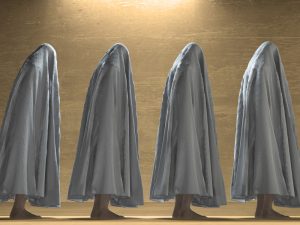One of the most common neglected health aspects of oneself is spiritual health. Like many things unseen, it is often neglected, but like many unseen things, they can cause the most damage to oneself overall happiness and health. Spirituality especially is important since it is the soul that is eternal. The temporal body is temporary and will one day again rise, but in its current fallen state, its needs should always come second to the soul.

Like unhealthy roots to a tree, the soul nourishes the overall life of the body and mind. When a soul is dark, life itself is dark. Guided by the impulses of the flesh and self, one can very easily become dark within and have a very unhealthy spiritual life. Even those who prayer and monitor their own spiritual life can become victim poor health. Whether is poor spiritual hygiene, gross neglect, or viceful choices, the soul that is unkept is a danger to eternal life.
Commentary
Delzell’s article hits the spot for one of the first thing that needs to be examined and that is whether or not one is a Christian in name only. Does one merely adhere to rituals but never live the faith? Is one’s faith part of one’s life in every aspect? Does one live a secular life only without any regard to God’s law? There is always a call to action in Christian life.
Another important element touched by Delzell is one righteous in Christ or self righteous? Many individuals are Pharisaical in their Christian life. They judge others and find themselves to be great because they are Christian and someone else is not. They hold others to standards that they themselves cannot hold and care more about their social look in the church than their private Christian life.
Numerous Pharisaical Christians condemn others, justify their superiority because of the title Christian and feel all must bend their knee to Christian ideals. All to common, they also mix politics with faith and create a nationalized blend of Christianity that discriminates and hates others. In many ways, like the Pharisees before them, they would crucify Jesus, Himself, if He stood up to their hypocrisy.
Spiritual Sloth

Spiritual health is also determined by spiritual life. It is of no wonder then that after pride and Pharisaical ideals, spiritual sloth is a killer to spiritual life. The habitual life style of spiritual sloth is likened to poor hygiene. One’s soul does not receive the cleaning and the grace it needs due to poor spiritual hygiene. Laziness in prayer, refusal to go to Mass or service, closing oneself to Scripture, or avoiding the Sacraments are all examples of spiritual sloth. The soul requires grace and through the prayer, fasting, and sharing the faith, the soul awakens and is cleaned by the grace of the Holy Spirit.
Spiritual Barreness
Some individuals enter into deep spiritual isolation and desolation. They are tempted by the materialism and atheism of the world. They may be spiritually injured due to trauma, or loss of a loved one and have lost there way. They seek God but cannot hear Him. They may be angry, or depressed but they feel no spiritual life. While in some cases, desolation can bring one closer to God over time, it can also for some lead them away. The individual loses hope. They fall into despair.
Others question their faith when prayers are not answered. They either become angry God would not answer a prayer, or feel their prayer was not good enough. Their childlike faith views faith as a contract not a covenant. It fails to see the role of suffering and offering up one’s cross.
Poor Conscience
Others possess a poor internal compass. The conscience itself which guides individuals towards God’s law naturally is distorted. It is either erroneous, or poorly formed. This lax conscience does not sting the soul when wrong is committed, either due to apathy or ignorance. Some consciences are hyper vigilant or scrupulous in nature and can haunt a person into believing every action is a sin. Properly formed consciences are key to a good spiritual life.
Spiritual Imbalance
Individuals can also suffer from a spiritual imbalance in life. In Christianity, spirituality and religious life balance the person as a whole. Spirituality is the daily personalized and internal element of spiritual life. It is meditation, Scripture, reflection and prayer. Religious life is ritual outside one’s personal space. It is proclaiming the victory of Christ in public and socially with other believers.
Both need to be balanced in order for one find Christ and share Christ.
Christian Guidance

Whether secularized, proud, slothful, barren, childlike or a broken conscience, individuals can find Christ. Like the properly planted mustard seed, it can grow and bear fruit if on good soil. It is a battle of constant maintenance. It involves an active prayer life, spirituality, a social religious life, Christian action, and reception of God’s Word and the sacraments. Only through grace can good actions find any merit or be guided properly. The Holy Spirit has granted individuals many venues for grace through the death of Christ. It is important to utilize these sources to live a more full Christian life.
Furthermore, examination of conscience is key. During Lent, one is especially able with the community of the faithful to celebrate the season of reflection and rectify certain vices, habits, or issues one may have with God.
Christian Counselors, Christian Mentors, Spiritual Advisors can all play key roles in helping one in Christian spirituality and life. They can be a friend, parent, or member of the clergy. They are someone with spiritual knowledge and practice that can help one grow in spiritual growth, discern life and share the Gospel.
Beyond becoming closer to Christ, spirituality also encompasses many religions and traditions. Religious and spiritual mindsets can play very important roles in mental and physical health as well. Religious principles can guide and anchor oneself when storms arise in life. They can be a source of calm and peace. It is also wise to turn to the saints and their numerous writings on spirituality and spiritual life. Many of their thoughts and ideas can help many struggling Christians.
Christian Counseling
If you would like to help others in their spiritual quest from a Christian world view, then please review AIHCP’s Christian Counseling Certification and see if it matches your academic and professional goals. The program is online and independent study and open to qualified professionals seeking a four year certification.
Additional Resources
“What Is Conscience?”. Joe Carter. March 4th, 2014. The Gospel Coalition. Access here
“The Spiritual Side of Sloth”. BeliefNet. Access here
Consolation and Desolation. Vinita Hampton Wright. Ignatian Spirituality. Access here
